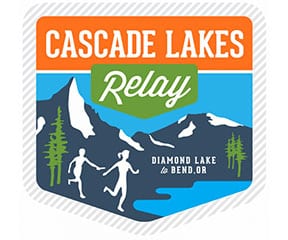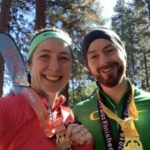The Cascade Lakes Relay is a 216.6 mile overnight relay in the style of Hood to Coast. Teams of 12 (or even 6 or 8) runners take turns running “legs” – shorter segments of 3 to 9 miles that link together at exchange points. A total of 36 (well, 37 if you want to get technical) legs comprise the Cascade Lakes Relay, so for a team of 12, that means you will run three times. Total mileage for each runner averages around 18 miles.
Ultra teams, or those with less than 12 members, will run anywhere from 4 to 6 legs. Most teams take about 32 hours to complete the 216.6 miles, which means that teams run through the night. Running in the dark often proves to be a new relay runner’s favorite experience.
We also offer a walk relay, which is a 132 mile version of the race that begins at Leg #13 in Silver Lake. Teams of 8-12 walkers work together to complete 24 legs (Legs #13 – 36 of the race). They walk through the night as well. Teams of 12 will each complete 2 legs for a total mileage of approximately 11 miles each (teams of 8 will each complete 3 legs). Walk teams take about 30 hours to complete the 132 miles.
Teams of 12 split into two “vans” (Suburbans and minivans work great too) to run the race. While Van #1 runs their first set of legs (#1 – #6), Van #2 will often find a place to eat, do some sightseeing or rest up at the major exchange point where they will start running. After Van #1 finishes their legs, Van #2 runs their first set of legs (#7-12), and Van #1 now gets to eat, sight-see or rest up. This run/rest switch-off continues throughout the race.
Teams are self-supporting, which means they carry their own water and food during the race. We do not have aid stations and water stops every mile, as you can imagine how difficult it would be to coordinate that feat across 216 miles! We do provide aid in critical areas that teams may not be able to reach their runner or walker; these are noted in the race guide.
Perhaps the most unique aspect of a relay like the Cascade Lakes Relay is the team aspect of running an event like this provides. Running is often a solitary sport, but in a relay, it’s all about your team. Our teams get in to the spirit by creating elaborate team names, wearing matching outfits, participating in contests, having spontaneous dance parties, cheering on fellow runners, and decorating their vans.
The Cascade Lakes Relay is a race, a celebration, and a vacation all wrapped up in one weekend of running. We invite you to discover what relays are all about, and why teams return year after year to run together!
We developed this race to highlight the beauty of Central Oregon and to provide a different relay experience – one focused on team spirit and camaraderie, a challenging and varied race course, an intimate feel, and a non-congested relaxed race experience. Scott took two years off work to develop the course and prepare for the first year and Scott and Carrie produced the inaugural CLR one week after getting married in July 2008.
LESS


Best Relay!
Cascade Lakes Relay continues to produce a stellar event experience, and 2021 was no exception (this was my 7th year). The event is very well organized and well-run, even while … MORE
Cascade Lakes Relay continues to produce a stellar event experience, and 2021 was no exception (this was my 7th year). The event is very well organized and well-run, even while having to navigate last-minute Air Quality issues, Cascade Relays adjusted the course so we could still have our CLR experience.
Reasons to run this relay: epic central OR scenery (starts at Diamond Lake, ends in Bend), challenging course (dirt and gravel forest roads, elevation gain, and altitude), camaraderie with other teams and overall awesome atmosphere. The event is also capped at a reasonable size, so you are not going to have the crowding issues of other relay events, like HTC.
Things to consider: build a team of people you want to experience a relay with (sweaty, stinky, sleep-deprived van time can be a highlight, with a great group of people)!
The whole event is at altitude and a lot of it on challenging terrain. The organizers may move the event to June for 2022 (should be announced soon), due to climate change and the ongoing issue of wildfires and air quality in OR; whether it’s in June, or end of July / early August, I expect CLR to continue to be a great event.
Definitely consider CLR if you are looking for an awesome relay race experience!